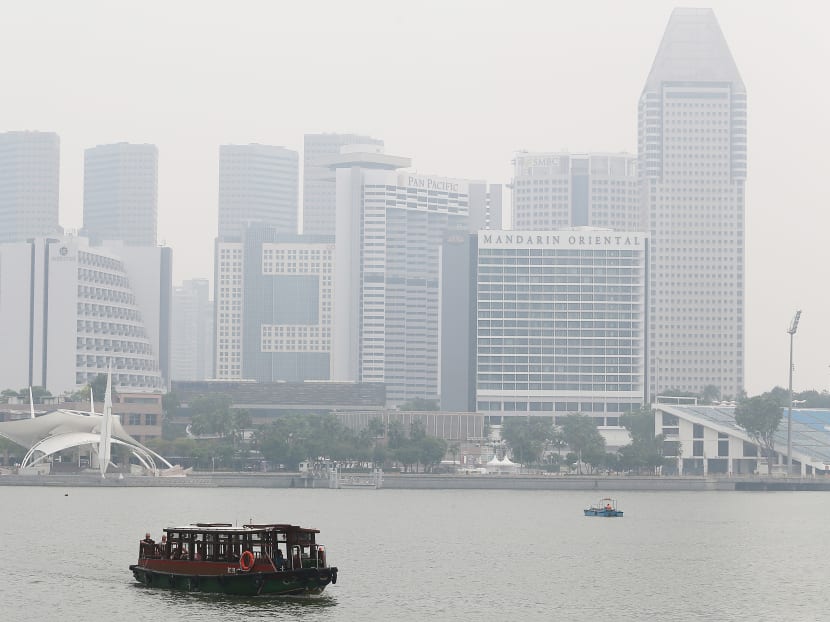Indonesian minister ticks off S'pore on haze
JAKARTA — In the latest critical remarks by an Indonesian minister on the transboundary haze, the country’s Minister of the Environment and Forestry Siti Nurbaya Bakar has told Singapore to focus on its own role in addressing the issue instead of “making so many comments”.
JAKARTA — In the latest critical remarks by an Indonesian minister on the transboundary haze, the country’s Minister of the Environment and Forestry Siti Nurbaya Bakar has told Singapore to focus on its own role in addressing the issue instead of “making so many comments”.
She was responding to Singapore’s Minister for the Environment and Water Resources Masagos Zulkifli’s statement at the 3rd Singapore Dialogue on Sustainable World Resources on Friday (April 15) that agro-forestry companies should take full responsibility for fire prevention and mitigation in their concessions, and that there must not be a repeat of last year’s forest fires which caused the haze.
In an interview with environment news portal foresthints.news on Saturday, Dr Siti Nurbaya said the Indonesian government has taken “substantial steps” to prevent land and forest fires, and the ensuing haze that envelopes the region every year.
She said such steps are based on decisions made by the Indonesian government, and not because of pressure from other countries, including Singapore,
“We have been consistent in sticking to our part of the bargain, especially by attempting to prevent the recurrence of land and forest fires and by consistently enforcing the law. So, my question is — what has the Singaporean Government done? I feel that they should focus on their own role,” she said.
In his speech on Friday, Mr Masagos had said companies should invest in efforts to rehabilitate degraded and fire-prone peatlands.
Companies must also ensure that sustainable policies and practices don’t stop with them, but are implemented throughout their supply chain, he added.
“My message to all these companies is simply this — companies practising unsustainable production that affect us with haze must know that their actions will not lead to profitability and that they will have to face the consequences sooner or later,” he said.
Mr Masagos also reiterated the comments he made in his Committee of Supply speech in Parliament last Tuesday, where he said a multi-faceted approach is needed from all stakeholders to prevent a recurrence of last year’s fires.
Ms Siti Nurbaya told foresthints.news that Singapore needed to do its own part in combating the haze.
“There is really no need to comment too much on the part Indonesia is currently playing. However, with all due respect to my Singaporean counterpart, what are they doing? And where has it got them?” she asked.
She said the Indonesian government had taken strict action against companies, especially those headquarted in Singapore, that are found to be negligent in handling land and forest fires that occur on their concessions.
“This is just one example of how we are not shirking our responsibilities and are doing what is expected of us,” she said.
“We really appreciate the input provided to us by our Singaporean neighbours and cherish our bilateral partnership, but I would respectfully ask them to stop making so many comments, particularly when it comes to the fires and haze-related issues. We each have our own part to play and we should focus on carrying this out.”
Transboundary haze caused by widespread fires in Indonesia affected the region from September to November last year and affected tens of millions of people.
The Pollutant Standards Index levels breached 2,000 in Central Kalimantan and Indonesians fled their homes for other cities, while in Singapore, the PSI crept to hazardous levels (above 300), causing schools to close on Sept 25.
While Indonesian President Joko Widodo had pledged tough action to tackle the annual haze problem, including issuing a moratorium on new permits for oil palm plantations and vowing to sack local military and police chiefs for uncontrolled fires in their provinces, some Indonesian politicians however, continued to make critical remarks.
Early last year, Indonesian Vice-President Jusuf Kalla had said: “For 11 months, they (our neighbours) enjoyed nice air from Indonesia and they never thanked us. They have suffered because of the haze for one month and they get upset.”
In September last year, he said Indonesia should not apologise to its neighbours for the haze and a month later, in an interview with Malaysian news agency Bernama, Mr Jusuf said the haze that affected Malaysia and Singapore was blown there by the wind — something Indonesia cannot control.
In October, Indonesian Coordinating Minister for Politics, Law and Security Luhut Binsar Pandjaitan described Singapore’s offer of one aircraft to Indonesia to help fight forest fires that have caused the thick haze as “insulting”.
But a month later, Mr Luhut apologised for the massive haze and promised that the government would be better prepared next year.
On Friday, the head of Indonesia’s Peatland Restoration Agency Nazir Foead had also pledged at the 3rd Singapore Dialogue on Sustainable World Resources that there is “zero chance” that any haze this year will be as severe as last year’s.







